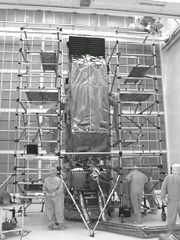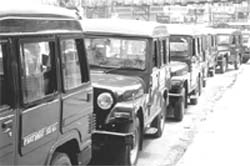MONEYMAKERS
The UK-based NEC Corporation and Ezaki Glico, a Japanese confectionary company, claim to have mastered the art of controlling and altering the catalytic properties of enzymes. For instance, the
The UK-based NEC Corporation and Ezaki Glico, a Japanese confectionary company, claim to have mastered the art of controlling and altering the catalytic properties of enzymes. For instance, the

With the launch of <font class='UCASE'>fuse, </font> scientists hope to understand the processes that led to the formation and evolution of stars, including our solar system

Farmers in Bangladesh, an agriculture-driven economy, are in for an era of dependency on hybrid seeds. Following a large-scale destruction of the country's paddy crops in the previous season, the
Kerala's conversion comes at a time when free and open source software (foss) acceptance is upscaling. Consider, first, other states. As early as 2002, Madhya Pradesh introduced foss in its

on april 23, the Delhi High Court will hear a case that is being dubbed as a "conflict between commercial interests and public health'. There are two main players

Although setting up of the EPA did result in policies to control pollution, political interference has blunted its effectiveness
In its cynical sense, the price of power is a phrase which often evokes rich imagery. Seen from any angle, the Indian government's decision to go in for what is going to be the world's largest,
The Impact On Urban Transportation By TATHAGATA CHATTERJI Thousands of sleek, little Tata-Nanos are likely to jostle for urban road space within a year. Nano boasts a brilliant design innovation for the all-weather travel requirements of the budget-conscious Indian family. However, the very affordability of the car has raised certain critical questions: If the roads are clogged by millions of new cars, will there be enough space to drive? How does one manage the legitimate aspirations of the Indian family in the urban context? The future of mobility in Indian cities, already teeming with bumper to bumper traffic and exasperated commuters, needs urgently to be addressed as the country moves towards an increasingly urban future along with the structural shift in the economy ~ from agriculture to industry and service. With 285 million people, urban India now accounts for 28 per cent of the country's population, 62 per cent of the GDP and the bulk of the car purchases. Between 1981 and 2001, on an average, the population in the six metro cities increased by 1.8 times but the number of vehicles rose six-fold. In the Delhi-NCR area, 420 million man-hours are lost every month because of traffic congestion, according to ASSOCHAM. With 1,421 cars per square kilometer, Kolkata now has a higher car density than the vastly more affluent Berlin. There has been a spatial shift as well with the IT and the IT-enabled sector emerging as the main factors of the urban economy and frequently locating to self-contained business complexes in the fringe areas of big cities. Such sleepy residential suburbs of the eighties as Gurgaon, NOIDA or Salt Lake, have now overtaken traditional business areas like Connaught Place or Dalhousie Square as corporate destinations of choice. This combined effect of "suburbanization' of the urban economy and the rising road congestion had compelled the state governments to construct highways and flyovers, replicating the American urban model of car dependent, low-density garden suburbs of the 1950s. However, as the Americans found out the hard way, by the 1970s, the ever-increasing freeways resulted in increased use of cars. This led to rising energy cost, pollution and travel time. Delhi is witness to a similar phenomenon today. Amongst the Indian cities, Delhi has the most extensive roadspace along with an elaborate programme of flyover construction. Over the past 10 years, road length increased by 20 per cent, but cars increased by 132 per cent. The ambitious Delhi-Gurgaon Expressway appears to have crossed the carrying capacity estimated for the year 2016 by the time it was inaugurated this year. The 32-lane toll plaza ~ supposedly the largest in Asia ~ has earned the sobriquet, "parking plaza'. Elsewhere, traffic moves fast on the flyovers but gets stuck in bottlenecks down the road. Compare this with New York, London, Paris or Singapore ~ the high temples of international finance ~ cities where people get around on foot, by taxi or via mass transit. Zurich, Melbourne, Copenhagen ~ which frequently tops the urban quality of living index ~ a sort of ATP ranking of the cities, have a dense urban core, pedestrian-friendly streets, a network of high quality mass transit and policies which discourage private cars in core areas. In parts of Tokyo, one cannot own a car unless one owns a private parking space. London introduced congestion charges in city centre areas in 2003. Since then the volume of traffic has been reduced by 21 per cent and delays shortened by two minutes per kilometer. The present gridlocked mess in India is the outcome of short sighted and uncoordinated policies on land use and transportation. According to a Centre for Science & Environment study, a bus carrying 40 passengers occupies about 2.5 times the roadspace than a car with one or two persons and, at the same time, pays 2.6 times higher tax as well. So the poor end up paying in terms of higher travel time and cost. The real estate costs are sky-high but a single parking slot that occupies 23 square metres costs only Rs 10 for a day, whereas a shop or desk space are charged full commercial rates. Diesel subsidies meant for the trucks and buses are gobbled up by chauffer-driven limousines. Public transport is chronically mismanaged and inadequate. The term

Nuclear power seems to be losing its charm in the corridors of power. The first indications of this came in the third week of August, when the Union government, unhappy with the performance of the

Latex obtained from succulents can be used to manufacture a host of products such as paints, adhesives and roofing material

This verbally loaded anti GATT film is a shrill intellectual harvest that tends to over romanticise the small organic farmer
The US-based Carrier Corporation has come up with what it claims is the world's first chlorine-free, non-ozone-depleting airconditioner. Carrier says that the new unit, Weathermaker 134a, uses
MANSUKHBHAI VASAVA is the only independent Scheduled Tribe member of parliament in Lok Sabha. He represents the Bharuch parliamentary constituency, supporting the BJP
NEC Corp, the Tokyo-based electronics concern, plans to dazzle consumers with a 256-megabyte flash memory chip. This "next generation" device, which will be 16 times as powerful as those now in the
...only stringent and serious measures can control further rise in pollution
Delhi is bursting at the seams from the pressures of rampant urbanisation. Everything that can possibly go wrong in this metro of 10 million people seems to have already gone wrong. The water, land and air everything seems to have been fouled up, the re

A full 10th of the city's water creates the most pampered oasis in the country

The Mexican government is enforcing waste disposal norms despite the lack of infrastructure, ensuring a windfall to multinational waste disposal companies
The Haryana chief minister's office turns down an appointment sought by the Down To Earth correspondent saying-What is special about Sukhomajri. So is the reaction of the local MLA Chander Mohan who
PET, or polyethylene terephthalate, the plastic from which soft drink bottles are made, is about to become the pet obsession of high-profile fashion-conscious North Americans. Wellman Inc, a New